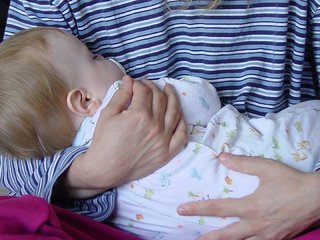
PARENTS of bawling babies take note: comforting them may work better than leaving them to cry - at least during the first few weeks of life.
Ian St James-Roberts of the University of London's Institute of Education and his colleagues recruited new parents from London and Copenhagen, Denmark. They also recruited a group of "proximal-care" parents from the UK, Denmark and the US, who planned to hold their infants for much of the time that they were awake and respond rapidly if they cried.
The parents were asked to keep a diary of their infants' crying and night waking as well as their own responses at 8-14 days, 5-6 weeks and 10-14 weeks of age. These were backed up by audio recordings, questionnaires on the babies' feeding and sleeping patterns, and home visits by the researchers.
At 10 days proximal-care parents held their babies for around 16 hours a day, and were more likely than other parents to sleep in the same bed as them at night. London parents held their babies for around 8 hours 30 minutes a day, and Copenhagen parents for just under 10 hours a day. The London parents also left their crying or fussing babies for much longer than both of the other groups.
The hands-off approach adopted by the London parents appeared to backfire: their children fussed and cried 50 per cent more than the other two groups at two and five weeks of age, and they were still crying more after 12 weeks.
The results also suggest there is little to gain from giving your baby a very high level of comfort and care. In general, Copenhagen babies cried as little as those given proximal care, and at 12 weeks they woke and cried slightly less often at night.
Comforting your baby on demand could minimise fussing and crying during the early weeks, concludes St James-Roberts, who presented his findings at a conference on infant sleeping and crying in Leicester, UK, last month. "But it makes no difference to the unsoothable bouts of crying that are the core of colic."
The results will be published in Pediatrics this week.
Source: New Scientist

No comments:
Post a Comment